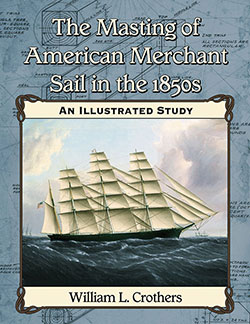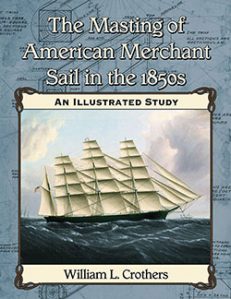The Masting of American Merchant Sail in the 1850s
An Illustrated Study
$55.00
In stock
About the Book
This book describes the intricacies of the construction and fabrication more than 150 years ago of masts and yards installed in American merchant vessels, particularly those spars which were “built” or composed of multiple pieces bound together by iron bands. These were referred to as “made” spars as opposed to spars constructed from a single tree. It also contains instructions for developing the shape and proportions of various spars. Very little information is available on this subject. Generally, the external sizes of individual spars can be found but intimate details are sorely neglected. In addition, the book includes the spacing and location of masts in a ship, and the rake, and it discusses the types of wood that are most desirable in the construction of spars.
About the Author(s)
Bibliographic Details
William L. Crothers
Format: softcover (8.5 x 11)
Pages: 188
Bibliographic Info: 57 illustrations, 2 maps, appendix, glossary, bibliography, index
Copyright Date: 2014
pISBN: 978-0-7864-9399-9
eISBN: 978-1-4766-1569-1
Imprint: McFarland
Table of Contents
Table of Contents
Acknowledgments vi
Preface 1
Introduction 3
Alphabetical List of Vessels 6
Chronological List of Vessels 10
Part I. How Masts and Spars Were Constructed
1. The Evolution of Masts and Spars for the Square Rigged Vessel 25
2. Timber Used in Mast Making 32
3. Harvesting, Storage and Preservation of Timber 34
4. Proportions of Masts and Spars 41
5. A Single Tree Mast and Bowsprit 52
6. Made-Masts and Made-Bowsprits 57
7. Upper Masts 75
8. Yards 82
9. Booms and Gaffs 92
Part II. Masting Arrangements
10. Location and Rake of Masts 99
11. Spar Plans of American Merchant Sail in the 1850s 103
12. The Spar Makers 124
Appendix: Masting Tables for Categories of Vessels Included in This Book 127
Glossary 173
References 177
Index 179
Book Reviews & Awards
“indispensable…one of the most important studies of the glory days of American merchant sail ever published”—Nautical Research Journal.





